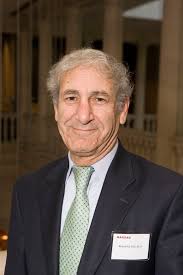BNN Editor Robert M. Post Wins Mogens Schou Award for Research from the International Society for Bipolar Disorder
On May 4, 2017, at the annual conference of the International Society for Bipolar Disorders (ISBD) in Arlington, Virginia, Dr. Robert M. Post, Editor-in-Chief of Bipolar Network News, was presented the Mogens Schou Award for Research. It is one of the most prestigious honors in the field of research on bipolar disorder.
Mogens Schou was a Danish psychiatrist and researcher whose research in the 1950s led to lithium’s use in the treatment of bipolar disorder.
Upon the announcement of the award by Dr. Marion Leboyer, who received the Schou research award in 2011, Dr. Post received a standing ovation. The following comments are adapted from Dr. Post’s acceptance speech.
“It is the highest honor I could imagine to receive an award from the ISBD in the name of Mogens Schou. Not only did Schou pioneer the development of lithium for the recurrent mood disorders, but he beat back the British naysayers and critics (Michael Shepherd and Harry Blackwood) by conducting the definitive long-term controlled studies of lithium, and then continued to promote its benefits.
In Schou’s obituary, fellow researcher Dr. Paul Grof wrote,”What was most striking and profound about him was his love and compassion for people.” Schou himself said upon receiving an award, “For me every single patient whose life was changed radically by lithium outweighs honors and awards.”
Thus, it is only appropriate that I relay some of the new data on the broad clinical effects of lithium, especially since lithium today is used way too infrequently, particularly in the United States. This list is a bit too condensed, but LITHIUM: increases neuroprotective factors and neurogenesis (adults like me in the room are happy to know that we are still making new neurons). Lithium increases the volume of the hippocampus and cortex, and blocks cell death.
Lithium prevents mania, depression, and even recurrent unipolar depression, and reduces suicides 10-fold.
Lithium lengthens telomeres [bits on the ends of DNA that protect it during cell replication] back to normal, enhances health and longevity, decreases the incidence of some neurological diseases (including dementia), and half a pill a day for one year prevents the progression of mild cognitive impairment.
Remarkably, higher trace amounts of lithium in drinking water prevent suicide in the general population. This has now been shown in more than a half dozen studies that compare naturally occurring levels of lithium in the water in different geographic areas.
No other drug comes close to having this range of benefits. So I can only reiterate a message Schou was determined to spread in his final years: “We need to use lithium more often.”
If Schou had seen the excess of childhood-onset bipolar disorder in the United States, he would surely have lobbied for better treatment of these young people and more treatment research.
I thank the ISBD for this great honor and the opportunity to try to foster Schou’s ideals.”
Continuing Marijuana Use After a First Episode of Psychosis Increases Risk of Relapse
 A 2016 article in the journal JAMA Psychiatry reports that continuing to use cannabis after a first episode of psychosis increases risk of relapse. The study by Sagnik Bhattacharyya and colleagues employed longitudinal modeling to determine the role of cannabis use in psychotic relapse. The researchers followed 90 women and 130 men for two years after a first episode of psychosis, and found that the more marijuana they used, the more likely they were to have a relapse of psychosis.
A 2016 article in the journal JAMA Psychiatry reports that continuing to use cannabis after a first episode of psychosis increases risk of relapse. The study by Sagnik Bhattacharyya and colleagues employed longitudinal modeling to determine the role of cannabis use in psychotic relapse. The researchers followed 90 women and 130 men for two years after a first episode of psychosis, and found that the more marijuana they used, the more likely they were to have a relapse of psychosis.
Relapse rates were highest (59.1%) for participants who used pot continuously following their first episode of psychosis. Relapse rates were lower (36.0%) for those who used cannabis intermittently thereafter, and lowest (28.5%) among those who discontinued cannabis use after their first episode of psychosis.
A statistical test known as a cross-lagged analysis was used to establish that cannabis use affected later relapse, rather than relapse of psychosis leading to further cannabis use.
Another statistical strategy using fixed-effect models revealed that risk of psychotic relapse was 13% higher during times of cannabis use than during periods of no cannabis use.
These findings offer some hope that the likelihood of psychosis relapse can be reduced, since ongoing cannabis use is a risk factor that can be modified, unlike family history or genetics. Bhattacharyya and colleagues called for research into interventions that can help discourage cannabis use in people who have had a first episode of psychosis.
Editor’s Note: N-acetylcysteine, a nutritional supplement sold in health food stores, can reduce cannabis use compared to placebo in teen users.
Early Cannabis Use and BDNF Gene Variant Increase Psychosis Risk
 Normal variations in genes can affect risk of mental illness. One gene that has been implicated in psychosis risk is known as BDNF. It controls production of brain-derived neurotrophic factor, a protein that protects neurons and is important for learning and memory. Another important gene is COMT, which controls production of the enzyme catechol-O-methyltransferase, which breaks down neurotransmitters such as dopamine in the brain.
Normal variations in genes can affect risk of mental illness. One gene that has been implicated in psychosis risk is known as BDNF. It controls production of brain-derived neurotrophic factor, a protein that protects neurons and is important for learning and memory. Another important gene is COMT, which controls production of the enzyme catechol-O-methyltransferase, which breaks down neurotransmitters such as dopamine in the brain.
Several forms of these genes appear in the population. These normal variations in genes are known as polymorphisms. Certain polymorphisms have been linked to disease risk. A study by Anna Mané and colleagues published in the Journal of Psychiatric Research in 2017 explored links between COMT and BDNF polymorphisms, cannabis use, and age at first episode of psychosis.
Mané and colleagues found that among 260 Caucasians being treated for a first episode of psychosis, the presence of a BDNF polymorphism known as val-66-met and a history of early cannabis use were associated with younger age at psychosis onset.
The val-66-met version of BDNF occurs in 25-35% of the population. It functions less efficiently than a version called val-66-val.
The researchers also found that males were more likely to have used cannabis at a young age.
Editor’s Note: In the general population, marijuana use doubles the risk of developing psychosis. Previous data had indicated that the risk was higher for those with a COMT polymorphism known as val-158-val that leads to more efficient metabolism of dopamine in the prefrontal cortex. The resulting deficits in dopamine increase vulnerability to psychosis compared to people with the val-158-met version of the COMT gene.
The new study by Mané and colleagues suggests that a common form of BDNF may be associated with an earlier onset of psychosis. Bottom line: Pot is dangerous for young users and can induce psychosis, particularly in people at genetic risk. Pot may be legal in many places, but heavy use in young people remains risky for mental health and cognitive functioning.
The company Genomind offers genetic testing for BDNF and COMT variants as part of a routine panel.
Cannabis Use May Cause Schizophrenia
 Cannabis use has been linked to schizophrenia risk, and new genetic research suggests a causal relationship between the two. In a 2017 article in the journal Molecular Psychiatry, researcher Julian Vaucher and colleagues reported that lifetime cannabis use was linked to schizophrenia even when the researchers controlled for 10 genotypes weakly associated with lifetime cannabis use. This makes it unlikely that the schizophrenia caused the cannabis use, suggesting instead that it is the cannabis use that leads to a schizophrenia diagnosis.
Cannabis use has been linked to schizophrenia risk, and new genetic research suggests a causal relationship between the two. In a 2017 article in the journal Molecular Psychiatry, researcher Julian Vaucher and colleagues reported that lifetime cannabis use was linked to schizophrenia even when the researchers controlled for 10 genotypes weakly associated with lifetime cannabis use. This makes it unlikely that the schizophrenia caused the cannabis use, suggesting instead that it is the cannabis use that leads to a schizophrenia diagnosis.
Vaucher and colleageus also controlled for genetic associations between cigarette smoking and cannabis use to eliminate cigarette use as a third variable causing the association between cannabis and schizophrenia.
The study by Vaucher and colleagues included 34,241 people with schizophrenia and 45,604 healthy controls.


